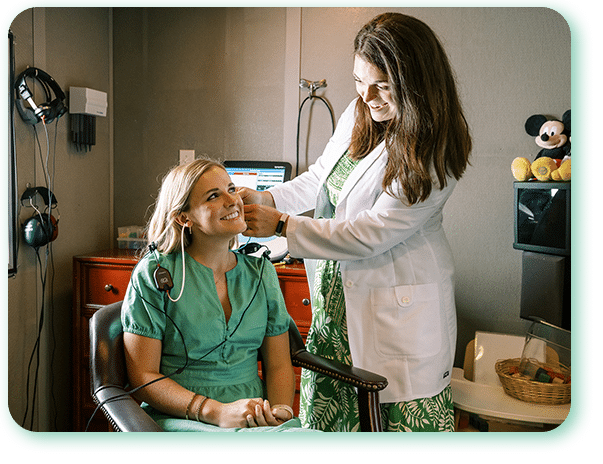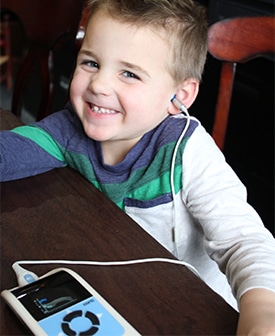Hearing Health in Knoxville

At Bridgewater Balance & Hearing, our goal is to help you or your loved one live life to its fullest. We all want to hear the beautiful sounds of nature, clearly understand conversations, and communicate with those around us.
Whether you are elderly and losing your hearing over time, or you have an infant whose hearing ability concerns you, we are dedicated and able to help you to the best possible outcome. We offer a full list of services for your hearing and balance.
Diagnostic Testing
At Bridgewater, we’re dedicated to the hearing healthcare of our patients. The first step on the road to better hearing is a proper diagnosis of the problem. Not all diagnostic processes and equipment are the same. We’re proud to have invested in the best equipment and a team of professionals who are highly trained and continually provide the best in complete hearing healthcare. We are confident we can find the issue that is affecting your hearing and offer real life solutions.
Tympanometry is conducted to test the condition of the middle ear and mobility of the eardrum (tympanic membrane). We use tympanometry to determine the health of the middle ear system.
In addition to evaluating the eardrum for proper movement and evaluating the pressure in the middle ear system, we are able to measure acoustic reflexes. Two small muscles—the tensor tympani muscle and the stapedius muscle—contract in response to loud sounds and we measure this response. The response can be elicited by stimulating one ear and measuring the response in the opposite ear. The presence or absence of the response can be used diagnostically to help us determine the nature of hearing loss.
Auditory processing is what happens when your brain recognizes and interprets the sounds around you. We hear when energy that we recognize as sound travels through the ear and is changed into electrical information that can be interpreted by the brain. The “disorder” part of auditory processing disorder means something is adversely affecting the processing or interpretation of the information.
At Bridgewater Balance & Hearing, we use comprehensive tests to determine if there is an auditory processing disorder and what type of disorder it is. First, we ensure the physiological basis of the auditory system is functioning normally, and if so, test to see if an auditory processing disorder is present and define its type. We are able to provide comprehensive management strategies and therapy to help “train” or “re-train” the brain to process sound in the most effective way.
What are the symptoms of auditory processing difficulty?
- Trouble paying attention to and remembering information that is presented orally
- Difficulty carrying out multi-step directions
- Poor listening skills
- Needing additional time to process information
- Low academic performance
- Often exhibiting behavior problems
- Poor reading, writing, and spelling skills
- Difficulty processing speech in the presence of background noise
Bridgewater Balance & Hearing provides auditory processing evaluations for children, adults, and seniors. If you have private insurance, we will bill your insurance company for the evaluation. Please call us at (865) 769-0283 to discuss your needs with us.
Roughly 50% of all dizziness is caused by inner ear disturbances. The way to determine if an inner ear disease is the cause of your feeling of off balance or dizziness is through videonystagmography (VNG) testing. VNG testing is comprised of a series of tests designed to evaluate a person’s ability to follow visual objects with their eyes and how well the eyes respond to information from the vestibular system. Testing will also include various head and body positions to determine the root cause of your dizziness.
This test also addresses the functionality of each ear and if a vestibular deficit may be the cause of a dizziness or balance problem. To monitor the movements of the eyes, infrared goggles are placed around the eyes to record eye movements during testing.
Otoacoustic emissions (OAEs) are sounds reflected from the inner ear when the cochlea is stimulated by a sound. When sound excites the cochlea, the outer hair cells vibrate. The vibration creates an echo that travels back through the middle ear. That reflection of sound can be measured with a small earphone inserted into the ear canal. However, when those hair cells become bent or broken, little to no sound can be reflected back.
OAE testing is completed for a number of reasons. It is often completed with newborns and children as a screening tool. It can also be used in conjunction with the results found through the hearing evaluation to differentiate between the sensory and neural components of a sensorineural hearing loss. OAE testing can also be used to determine the cause of someone’s tinnitus or ringing in the ears.
The auditory brainstem response (ABR) test gives information about the inner ear and brain pathways for hearing. An ABR test can be used with a variety of patients. It is often ordered if a newborn fails the hearing screening test given in the hospital. The ABR can also be used with older children if there is a suspicion of hearing loss that was not confirmed through behavioral hearing tests. Additionally, it can be utilized if a patient reports signs or symptoms suggesting a type of hearing loss that’s origin is from the nerve of hearing or within the brainstem.
The ABR is performed by placing electrodes on the head and recording brain wave activity in response to sound. As sounds are sent through the insert earphones, the electrodes measure how the hearing nerves respond to them. We will look for specific neurological “markers” in the recorded response. The softest level at which these markers appear roughly corresponds to the hearing level at that specific pitch. The person being tested rests quietly or sleeps while the test is performed. No response is necessary.
In the state of Tennessee, every newborn is mandated to have their hearing screened via Automated Auditory Brainstem Response (AABR) or Distortion Product Otoacoustic Emissions (DPOAE), whether it is within a hospital or a homebirth. Following the initial hearing screening, a newborn may be referred to an audiologist for further testing due to a “failed” screening or hearing loss risk factors.
Our audiologists are trained and qualified to follow-up on these newborns with the correct testing and provide the family with support and guidance. If diagnosed with a hearing loss, we work to guarantee the child has the best early intervention opportunities and services available.
As we know, hearing loss varies in degrees of severity. For an individual with profound hearing loss, daily communication can be frustrating and impossible. Fortunately, with technology advancements, cochlear implants are a brilliant option for those who meet the candidacy guidelines.
A child as young as 12 months of age can be approved for a cochlear implant, as well as adults. At this time, 188,000 people have received a cochlear implant worldwide. At Bridgewater Balance & Hearing, we provide cochlear implant evaluations to determine if our patients qualify for approval. The purpose of the evaluation is to quantify the individual’s preoperative hearing thresholds, communicative status, and use of previous hearing amplification.
For our patients who have received a cochlear implant, we provide cochlear implant mapping. Cochlear implant mapping refers to programs we use to optimize the functionality of your cochlear implant. We establish different thresholds and comfort levels so electrode settings can be adjusted to optimize sound quality. This will ensure you are hearing sounds at a comfortable level.
Additional Services
In addition to our diagnostic audiological and balance services, we offer a range of services and programs to help you or your child with your hearing health.
- Sole Provider of Services for East Tennessee’s Division of Intellectual Disabilities Services
- We Evaluate and Dispense Hearing Instruments through the Medicaid Waiver Program
- Tennessee Early Intervention Services
- Disability Determination for the State of Tennessee
- Workman’s Compensation
- University of Tennessee, Department of Audiology, Extern Site
- Monthly Free Hearing Health Clinics at:
- Shannondale
- NHC-Farragut

Home Visits
At Bridgewater Balance & Hearing, we understand it may be difficult to come into one of our offices, or to transport your loved one. We are happy to work with you and provide complete hearing healthcare in the comfort of your home. Additionally, we are frequently called to nursing homes to assist patients with their hearing needs.
Insurances Accepted
Bridgewater is a provider of major medical insurance to include TennCare and Medicare. We will work with you and your insurance company to ensure you are receiving your maximum benefit. We also accept the following major insurance providers:
- Aetna
- Amerigroup Tenncare
- Bluecare Tenncare
- BlueCross BlueShield
- Cigna
- Humana
- Medicare
- Mailhandlers
- NALC
- Pomco
- Tricare
- Triwest
- United Healthcare
- UHC Community Plan Tenncare

